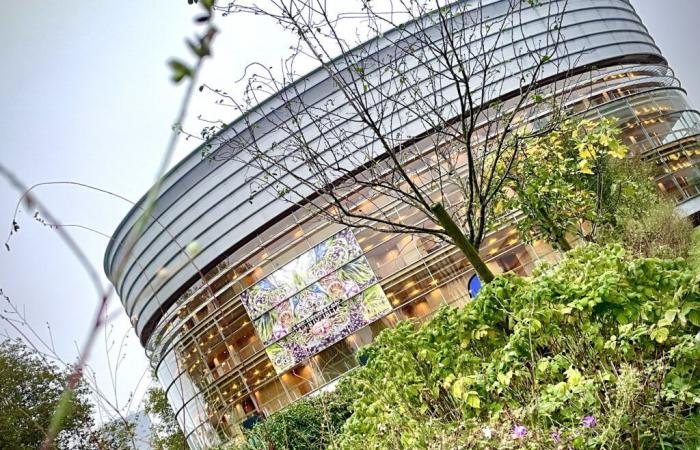A few days before the American presidential election, the Utopiales science fiction festival, a major meeting for political reflection, had a particular flavor for this edition displaying the theme of harmony. “ It’s a great subject. We are experiencing times of intense tension – the geopolitical situation of the world, clashes on social networks, generative AI which destroys jobs, Elon Musk who subsidizes fascist idiots like Trump… The right is certainly seeking harmony, but seeking to crush differences. So we have to tune them musically, accept people who are not like us, foreigners, non-binary”introduced the star author Alain Damasio in a masterclass regularly interrupted by applause. An audience with hair of all colors, raising their hands in large numbers to ask their questions to the almost 300 speakers gathered in Nantes from October 30 to November 3.
“SF is a space for reflection towards a society in harmony. Imaginary literature depicts contemporary anxieties, and one of the ways of SF is to create hope, to escape from everyday dystopia.agreed Nicholas Martin at the microphone of Marie Laborywho interviewed him live for France Culture. The former science journalist published Au Diable Vauvert his first novel, Fragile/swhich questions the notion of norm – such as that of having to love one’s child at all costs, or that of “good” health leading to the rejection of “disability”. “Frankenstein’s creature is the victim. Abnormality is cool. I like monsters, like the title Emil Ferris! ». Who signs the poster for this edition giving pride of place to horror booming across the Channel.
New artistic direction
To download this document, you must first purchase the corresponding item.
It’s one of the artistic direction’s favorite genres, entrusted this year (and for those to come) to a quartet. A configuration criticizedor rented by interested parties: “It is an enrichment to be four of us, to have collectively reflected on the readings and authors that this theme of Harmony evoked for us, to then propose round tables”defends Eva Sinanianthe bookseller of Mots à la bouche (specializing in LGBTQI+ cultures) and one of the four members of the committee, with Nicolas Martin, the editor at Atalante Yann Olivier (and volunteer at Utopiales since she was 14) and the author Floriane Soulaswinner of the Utopiales 2022 prize.
A prize whose organizational methods have not changed since its beginnings, whatever the critiques : the publishers are offering two titles, available on July 15 to be read by booksellers throughout France. It was presented this year to Marge Nantel for his novel Ardant Code (Mnémos editions).
SF expansion
Enough to ensure good sales? “We still suffer from a lack of visibility in the general media. The few times they talk about SF, it’s to quote general publishers, out of laziness and ignorance”regret Mathias Échenayfounder of La Volte editions.
It remains that the boundaries between SF and general literature are increasingly porous. For its 50th anniversary, the Canadian magazine Solaris released a special issue with authors it has never published and “who navigate between general literature and imagination”presents Pascal Raudco-editor-in-chief of the journal. “The authors of the non-imaginary, we must tell them to come, to share our love of the imagination, there is always room », he continues.
The journal nevertheless points out its difficulty in publishing more non-Canadian authors: to benefit from state subsidies, it must not exceed 25% foreign content. “Stopping at our borders is anti-SF!” The more diversity, the better! », proclame Pascal Raud.
To download this document, you must first purchase the corresponding item.
The community is expanding, joins Nicolas Martin. “White literature welcomes the imagination”he recalls, citing The anomaly d’Hervé Le Tellier (Gallimard), whose cumulative sales in large format and paperback reach one and a half million copies.
He also makes this sad joke: “Dystopia has left the SF section to join the current affairs section! ». At the same time, SF is opening up more. “Part of SF is very “mascu”, but more and more authors come from diversity and are rethinking, for example, the notion of heroes — or even creating novels without heroes. Imaginary literatures are real spaces of inclusiveness. » With more and more festival-goers every year.
Alain Damasio, amazed by the packed auditorium for his masterclass, was ecstatic: “I remember “Utos” in 2001, people still thought that SF was a minor genre. But it’s over”. What helped? The crisis of narcissism, he argues: “SF has never stopped questioning the specificity of humans over animals and machines. But we realize that that no longer holds: birds create, elephants have rites, generative AI speaks. There is little that differentiates us from animals and machines anymore. »
Success
Machines that we are training today to behave like blobs, single-celled creatures capable of finding the shortest path to food, and therefore to offer, for example, the most efficient railway networks – the subject of one of the 137 meetings combining literature and science.
When there were not crowds there, festival-goers gathered in the bookstore of the city of Congresses, which was saturated. “A festival is ultra-crucial for giving authors a voice in front of an audience and keeping booksellers working. It creates excitement. We always sell more books by an author who participates in festivals »rejoices Jerome Vincentdirector of New ActuSF editions.
Festivals of the imagination have also multiplied in recent years: Les Hypermondes in Mérignac (since 2021), Étrange-Grande (since 2022), L’Ouest Hurlant (2022), Sirennes (2022), Trolls et Légendes become annual… Les Utopiales, “it’s the oldest and the biggest, mixing science, books and cinema”. All in harmony and resonance.






